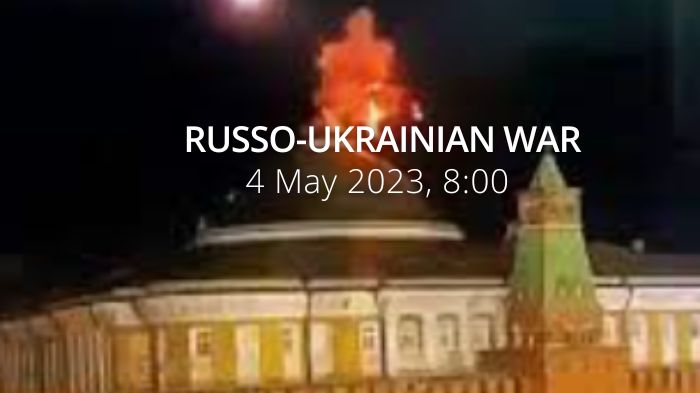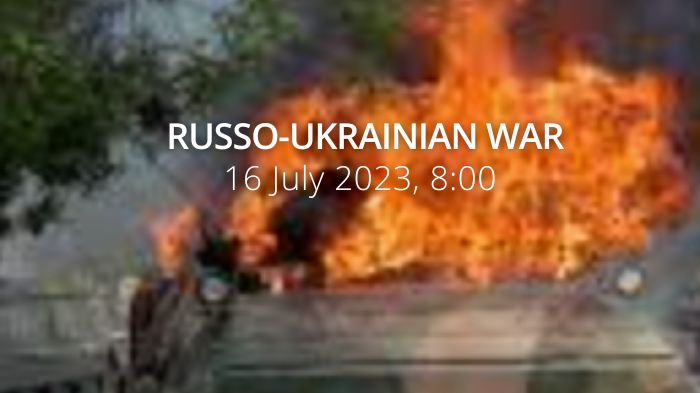Daily overview — Summary report, December 4
A map of the approximate situation on the ground in Ukraine as of 00:00 UTC 04/12/22.
— War Mapper (@War_Mapper) December 4, 2022
There have been no notable changes to control since the last update. pic.twitter.com/N1xVBTfwRj
The General Staff’s operational update regarding the Russian invasion as of 06.00 am, December 4, 2022 is in the dropdown menu below:
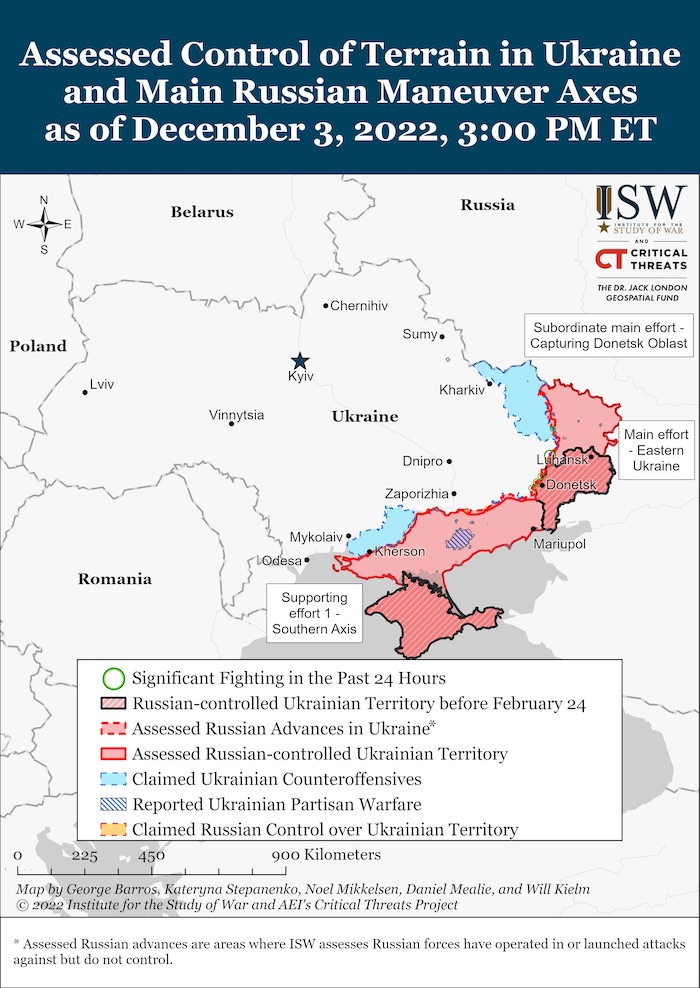
- On the Siverskyi direction, Russian forces shelled the settlements of Sopych and Timofiivka, Sumy oblast, with mortars.
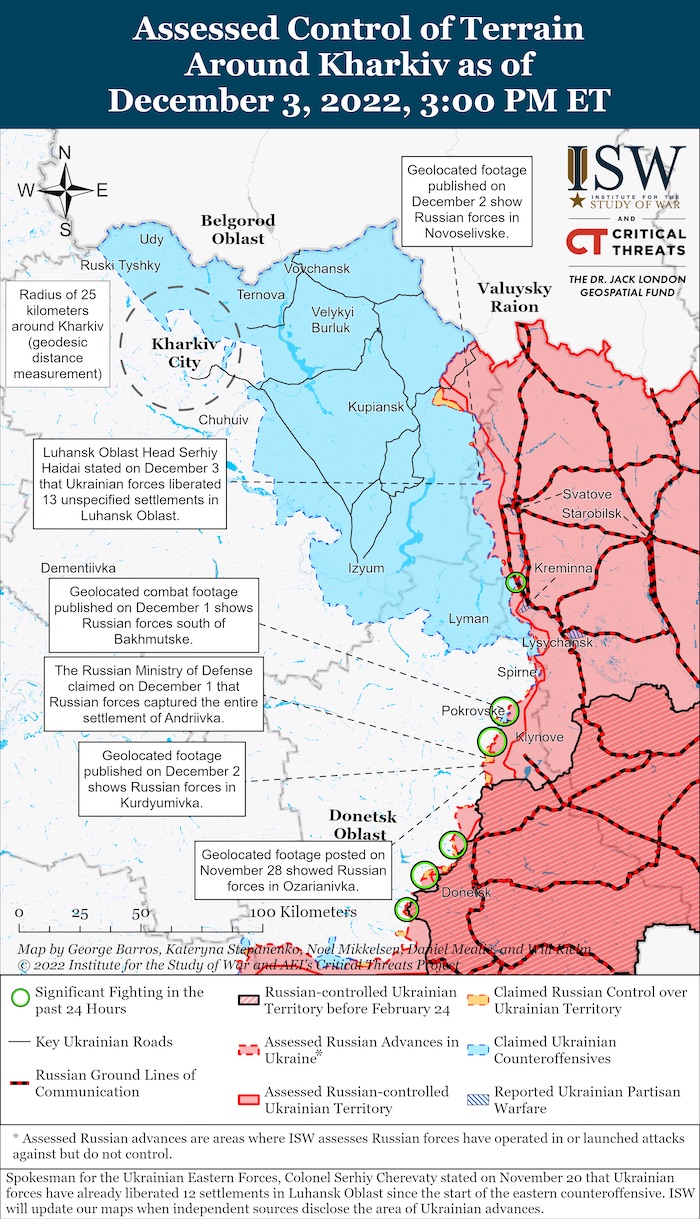
- In the Slobozhanskyi direction, more than ten settlements were hit by artillery fire. Among them are Odnorobivka, Strilecha, Neskuchne, Ternova, Starytsa, Ohirtseve, Chernyakiv, Chuhunivka and Dvorichna of the Kharkiv oblast.
- Russian forces are defending in the Kupiansk and Lyman directions. Fired tanks and artillery of various calibres in the areas of Synkivka, Tabaivka, Berestove and Vyshneve in the Kharkiv oblast and Makiivka, Ploshchanka and Bilohorivka in the Luhansk oblast.
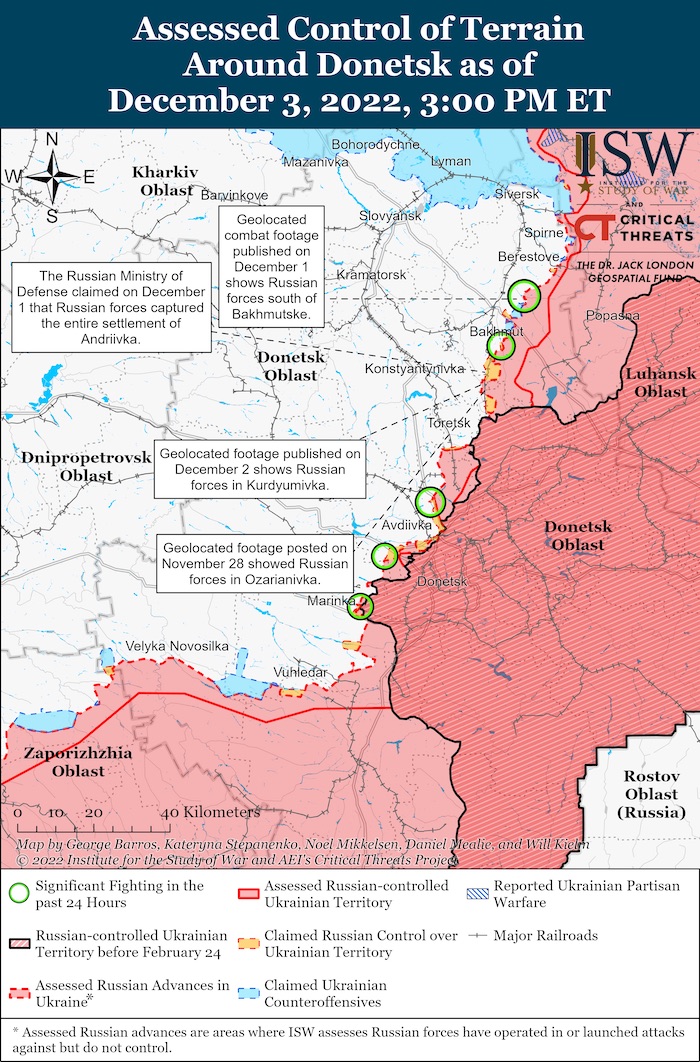
- In the Bakhmut and Avdiivka directions, the occupiers are concentrating their main efforts on conducting offensive actions, trying to improve the tactical position. In particular, the districts of Serebryanka, Bilohorivka, Verkhnyokamyanske, Yakovlivka, Soledar, Bakhmut, Kurdyumivka, Pivdenne, Avdiivka, Opytne, Vodiane, Pervomaiske, Nevelske, Krasnohorivka, Vesele, Mariinka, and Novomykhailivka were shelled by tanks, mortars, artillery and MLRS in Donetsk oblast.
- Russian forces are defending in the Novopavlivsk direction. It subjected the areas of the settlements of Velyka Novosilka, Vuhledar, Prechystivka and Zolota Nyva of the Donetsk oblast to the fire.
- Russian forces are on the defensive in the Zaporizhzhia direction. Artillery shelling was recorded, in particular, near Orikhiv, Zaporizhzhia oblast.
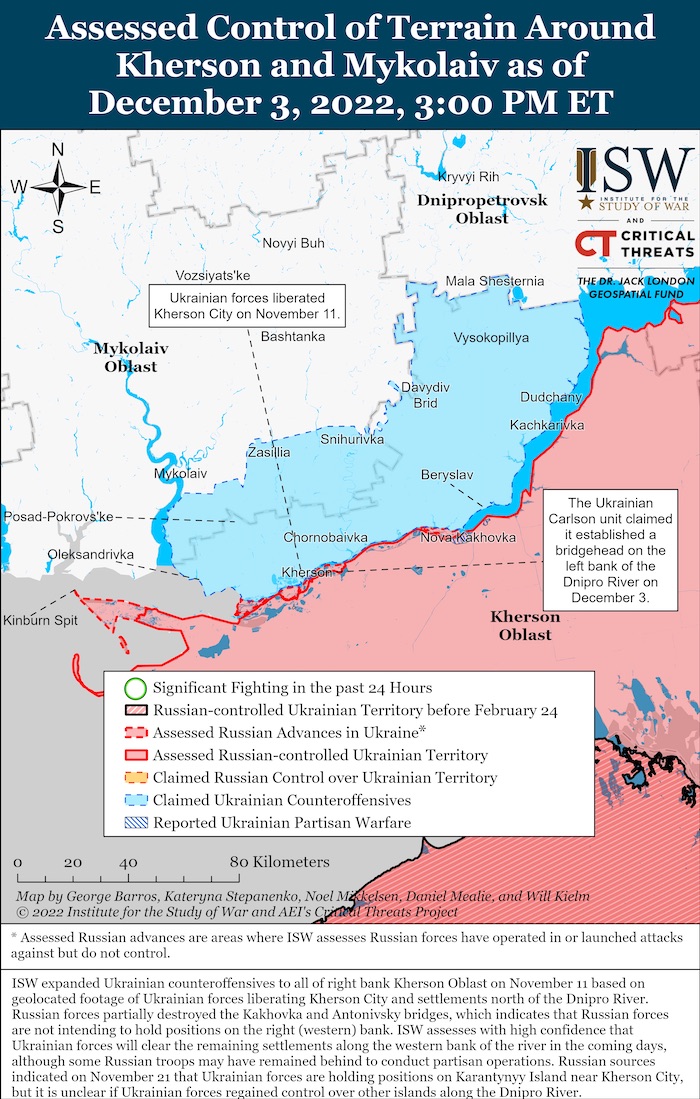
- The occupiers are also defending in the Kherson direction. They are shelling the positions of our troops, as well as populated areas of Dnipropetrovsk and Kherson oblasts, with mortars, artillery and MLRS. The fire terror of the civilians of Kherson does not stop.
Military Updates
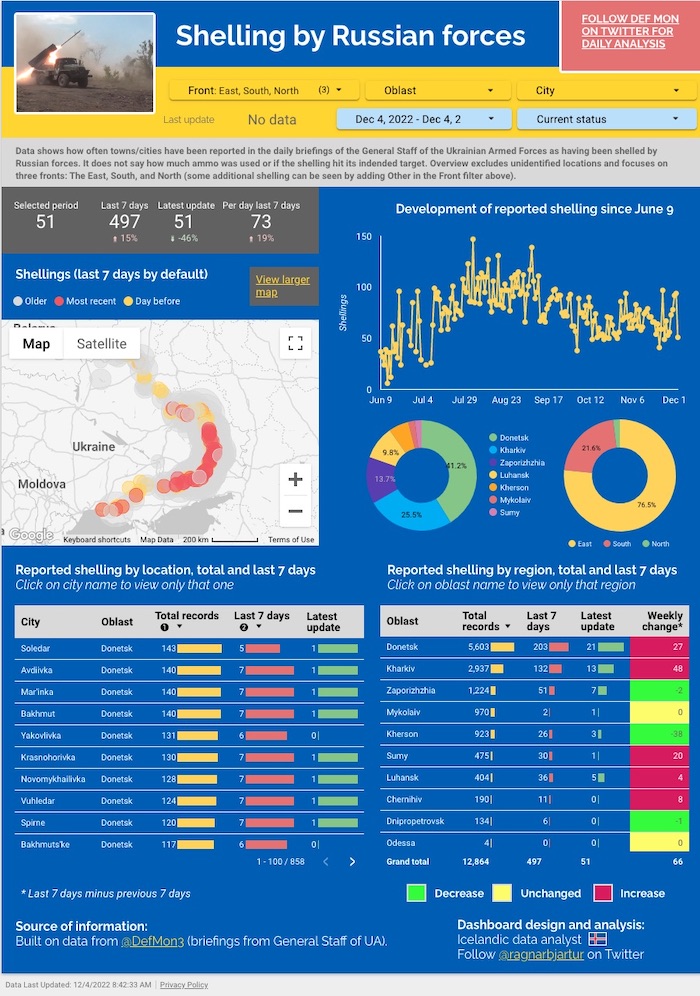
Russia keeps 24 Kalibr missiles armed in the Black Sea – defence forces of Ukraine’s south, Ukrainska Pravda reports, citing Nataliia Humeniuk, head of the press centre of the Operational Command South. "Russian forces have now put 18 ships on combat duty; almost all of them are trying to withdraw from the base. Currently, there are four [cruise missiles carrying warships] on combat duty, two of which are [submarines]. These are 24 Kalibr-type missiles that are ready for use." Ukrainian authorities begin to evacuate people from the left bank of the Dnipro River in Kherson Oblast; combat actions expected to step up, Ukrainska Pravda reports, citing the Kherson Oblast Military Administration. "The evacuation is necessary due to the possible intensification of hostilities in this area. Therefore, the ban on moving across the waters will be lifted during the specified period, but only during daylight hours. River crossings will be allowed at the River Port section. On other sections of the river, there will be no permission to cross on the specified dates. In case of the need for extra time to arrive at the liberated territory, citizens are requested to dock only at the River Port, as the only permitted place. During the evacuation, it is necessary to carry the documents confirming one’s identity and confirming Ukrainian citizenship. The authorities do not specify whether there is an agreement with the occupiers in this regard, or how they will react to the evacuation.” https://twitter.com/EuromaidanPress/status/1599024775355154434Ukraine once made the missiles that terrified the world. It shouldn't have to beg for ATACMS. But there are many "buts." A physics researcher tells us that efforts to relaunch Ukraine's long-range missile production are already here- if the west will allowhttps://t.co/Y3ooU5cYlg pic.twitter.com/aNnFXlDiE3
— Euromaidan Press (@EuromaidanPress) December 4, 2022
According to British Defence Intelligence, (last 48 hours):
- Recent polling suggests that Russian public support for the ‘special military operation’ is falling significantly.
- An independent Russian media outlet has claimed access to data collected by Russia’s Federal Protective Service for internal use. The data indicated 55 percent of Russians favour peace talks with Ukraine, with only 25 percent claiming to support continuing the conflict. These results are consistent with a separate October 2022 survey where 57 percent of respondents reported being in favour of talks. In April 2022, around 80 percent of Russians claimed to support the operation.
- Despite the Russian authorities’ efforts to enforce pervasive control of the information environment, the conflict has become increasingly tangible for many Russians since the September 2022 ‘partial mobilisation’. With Russia unlikely to achieve major battlefield successes in the next several months, maintaining even tacit approval of the war amongst the population is likely to be increasingly difficult for the Kremlin.
- Russian forces continue to invest a large element of their overall military effort and firepower along an approximately 15km long sector of entrenched front line around the Donetsk Oblast town of Bakhmut.
- Russia’s plan is likely to encircle the town with tactical advances to the north and south. In recent days, Russia has highly likely made small advances on the southern axis of this assault, where it is seeking to consolidate limited bridgeheads to the west of the boggy ground around the minor Bakhmutka River.
Losses of the Russian army
As of Sunday 4 December, the approximate losses of weapons and military equipment of the Russian Armed Forces from the beginning of the invasion to the present day:- Personnel – about 91150 (+550),
- Tanks – 2922 (+5),
- Armoured combat vehicles – 5892 (+6),
- Artillery systems – 1908 (+2),
- Multiple rocket launchers –MLRS - 395 (+0),
- Air defence means – 210 (+0),
- Aircraft - 281 (+1),
- Helicopters - 263 (+o),
- Automotive technology and fuel tanks – 4479 (+7),
- Vessels/boats - 16 (+0),
- UAV operational and tactical level – 1573 (+1),
- Special equipment – 163 (+0),
- Mobile SRBM system – 4 (+0),
- Cruise missiles – 531 (+0)
Humanitarian
Russia had a secret plan to wipe Ukraine off the face of the Earth. This report tells why it failedOver 11.5M Ukrainians forcibly deported since Russian invasion started – Internal Affairs Ministry, Ukrinform reports. “Over 11.5 million Ukrainians have been forcibly deported by Russia since the full-scale invasion started. The relevant statement was made by Ukrainian Internal Affairs Deputy Minister Kateryna Pavlichenko. Amid the full-scale invasion, full-scale war, and the humanitarian crisis we are facing now, the problem of human trafficking is taking on a new urgency. […] Today we are facing new challenges: the humanitarian crisis, the movement of millions of Ukrainians abroad in search of a calmer, safer place, and the forced relocation, deportation of Ukrainians, namely children, to Russia, Belarus and the temporarily occupied areas, Pavlichenko noted.” Kyiv schools adapt to survive under Russian bombardment, Reuters reports. “Despite the missile strikes and power cuts that have become a regular occurrence in Ukraine's capital, Kyiv's 190,000 remaining school children are still expected to attend classes, whether online or in person. If there is no light, it's sometimes hard to see when you are writing, said Yulia, 13, sitting in the front row of an English lesson with around a dozen classmates in a western suburb of the city. Though her school, like most buildings in Ukraine's embattled capital, experiences regular electricity cuts caused by Russian missile barrages on the power grid since October, city officials insist pupils will at least be able to finish the current semester, which ends on Dec. 23. We really need to hold on for these three weeks, Oleksiy Kurpas, an adviser to the deputy head of Kyiv's city administration, told Reuters in one of the airy yet warm corridors of the Soviet-era school. Kurpas expressed hope that the school year would run until the summer, but the wider situation is bleak: nearly half of Ukraine's power grid has been wrecked and Kyiv has said it expects further attacks. The official said that about 85% of Kyiv's pre-war school staff remained in the city, compared with 60% of pupils. The other students have moved to safer regions or abroad. As a result, schools have been working in a hybrid mode both in person and online since the start of the academic year. Online classes are attended by many students still in Kyiv, as there is still a city-wide shortfall of 35,000 places in school bomb shelters where students and staff must take refuge during air raid sirens. […] The school's head teacher, Olena Roman, said staff were sometimes unable to set homework if the power suddenly went down, and pupils learning remotely often struggled during power cuts in their homes. Kyiv's mobile coverage drops significantly during outages, as base stations are forced to use backup batteries with limited power reserves. Kurpas acknowledged this was a problem and said his own child had been affected by it but added that all possible measures, such as passing on the material through several messaging apps at once, were being taken to minimise the impact on learning. Despite the city's precarious situation, Roman remained confident that the school would keep teaching. We will continue working, without question ... we have a generator, it will allow us to work in any situation, and that is what we will do, she said. Kyiv's private schools, many of which opened in the years preceding the invasion, have been able to use their greater financial resources to prepare extensively for the disruptions. A small private school in north Kyiv has even established a heated and powered "hub" for parents who want to find refuge from cold, dark homes. […]"
Millions of refugees from Ukraine have crossed borders into neighbouring countries, and many more have been forced to move inside the country. The escalation of conflict in Ukraine has caused civilian casualties and destruction of civilian infrastructure, forcing people to flee their homes seeking safety, protection and assistance the UNHCR reports. As of 29 November:Russia loots Ukrainian grain worth USD 1 billion, according to Bloomberg
— Euromaidan Press (@EuromaidanPress) December 3, 2022
Russia has plundered occupied territories of Ukraine looting up to 6 million tons of wheat crop.
Map by Bloomberghttps://t.co/V5i6NltBRq pic.twitter.com/PCWxKSBJAa
| Individual refugees from Ukraine recorded across Europe: | 7,891,977 |
| Bulgaria, Czech Republic, Hungary, Poland, Republic of Moldova, Romania, Slovakia | 2,363,697 |
| Other European countries | 2,658,676 |
| Russian Federation, Belarus | 2,869,604 |
| Refugees from Ukraine registered for Temporary Protection or similar national protection schemes in Europe: | 4,776,606 |
| Bulgaria, Czech Republic, Hungary, Poland, Republic of Moldova, Romania, Slovakia | 2,357,342 |
| Other European countries | 2,419,264 |
| Border crossings from Ukraine (since 24 February 2022): | 15,835,332 |
| Border crossings to Ukraine (since 28 February 2022): | 8,125,775 |
️Environment
https://twitter.com/EuromaidanPress/status/1599118166143094784 Russia awaiting a response on Zaporizhzhia nuclear safety zone, talks ongoing – RIA, Reuters reports. “Russia has outlined its position on the creation of a safety zone around the Zaporizhzhia nuclear power plant and is now awaiting a response, Russia's RIA news agency reported on Friday citing the head of state-run nuclear energy agency Rosatom. Our representative at the IAEA (International Atomic Energy Agency) in Vienna, Mikhail Ulyanov, is actively working, we all understand, but now the decision is not on the Russian side, not in Moscow, Rosatom CEO Alexei Likhachev was quoted by RIA as saying.” Russia is ready to abandon Zaporizhzhia NPP in exchange for transit of oil and gas through Ukraine, Ukrainska Pravda reports, citing Meduza. “A source close to the Kremlin and an interlocutor close to the Russian government, claims that the Russian Federation is ready to quit Zaporizhzhia NPP, but does not plan to completely leave Zaporizhzhia Oblast. Meduza reports that the Kremlin plans to hand over the NPP either to the Ukrainian authorities or to the IAEA. As the sources state, in exchange for the withdrawal of troops from the NPP, the Russian authorities expect to receive guarantees of uninterrupted transit of oil and gas through the territory of Ukraine. The interlocutors claim that both the Kremlin and the government "are ready for an agreement," since "pumping and selling oil and gas is very important for the Russian budget." In a comment to Meduza, Dmitry Peskov, the Press Secretary of the President of the Russian Federation, rejected the possibility of such an agreement.”Legal
European Commission Proposes to Criminalise the Violation of EU Sanctions, European Pravda reports. “The European Commission has put forward a proposal for the harmonisation of criminal offences and penalties for violations of EU restrictive measures. "While the Russian aggression on Ukraine is ongoing, it is paramount that EU restrictive measures are fully implemented and the violation of those measures does not pay off. The Commission proposal sets out common EU rules, which will make it easier to investigate, prosecute and punish violations of restrictive measures in all Member States alike," the EC statement reads.” 443 children were killed, 852 children injured, 12,572 deported by foe forces, and 330 reported missing - the Office of the Prosecutor General of Ukraine reports as of December 4. 2,719 educational establishments are damaged as a result of shelling and bombings, 332 of them are destroyed fully. 51,161 crimes of aggression and war crimes and 18,585 crimes against national security were registered.#Russia invaders imprisoned 14-year-old boy and girls in #Kherson and #Mykolaiv oblasts #Ukraine #Snihurivka #StandWithUkraine #RussiaWarCrimes #StopRussia https://t.co/Aa1fIoko9D pic.twitter.com/E0KJPeky87
— Halya Coynash (@halyapuff) December 3, 2022
Support
Germany to send seven additional Gepard tanks to Ukraine, Reuters reports. “Germany is preparing to deliver seven Gepard tanks to Ukraine, adding to the 30 air-defence tanks that are already being used to fight against the Russian army, according to a German government website. According to Spiegel magazine, which first reported the number of additional tanks, the seven Gepards, which were initially destined for the scrap pile, should arrive in Ukraine in Spring 2023 and are currently being repaired by Munich-based arms manufacturer Krauss-Maffei Wegmann (KMW).” Bulgaria to send nine Boeing aircraft with weapons to Ukraine – media, Ukrinform reports. “According to Ukraine's Ambassador to Bulgaria, Vitalii Moskalenko, the list is "long and serious" and it includes artillery guns, means of defence, shells and ammunition. According to the report, Bulgaria cannot transfer S-300 missile systems because it needs them to protect strategic sites in the country. The Bulgarian parliament voted on November 3 to approve the supply of weapons to Ukraine amid Russian aggression.”New Developments
https://twitter.com/EuromaidanPress/status/1599146958555226112- S. defence secretary accuses Russia of 'deliberate cruelty' in Ukraine, Reuters reports. “US Defense Secretary Lloyd Austin on Saturday accused Russia of deliberate cruelty in its war in Ukraine, saying Moscow was intentionally targeting civilians. With deliberate cruelty, Russia is putting civilians and civilian targets in its gunsights, Austin told the Reagan National Defense Forum in Simi Valley, California. Russian attacks have left children dead, schools shattered, and hospitals smashed, he said.”
- NATO countries in OSCE calls on Russia to withdraw its troops from Ukraine, Ukrinform reports, citing a joint statement. “NATO member states, as well as the NATO Invitees Finland and Sweden, in a joint statement called on Russia to stop its aggression against Ukraine and "fully and unconditionally" pull back its troops from Ukrainian territory. "We call on Russia to immediately stop its war of choice and fully and unconditionally withdraw from Ukraine," the statement reads.”
- Macron says new security architecture should give guarantees for Russia, Reuters “The West should consider how to address Russia's need for security guarantees if President Vladimir Putin agrees to negotiations about ending the war in Ukraine, French President Emmanuel Macron said in remarks broadcast on Saturday. This means that one of the essential points we must address - as President Putin has always said - is the fear that NATO comes right up to its doors, and the deployment of weapons that could threaten Russia, Macron said. […] Macron's remarks suggested he was sympathetic to Moscow's need for security guarantees - a demand that was the focus of intense but failed diplomacy in the run-up to the war.”
- Servant of the People party leader names conditions for negotiations on security guarantees for Russia, Ukrainska Pravda “Davyd Arakhamiia, Head of the Servant of the People (Sluha Narodu) parliamentary faction and former head of the negotiating group with the Russian Federation, has put forward conditions for possible negotiations on the security guarantees for Russia that French President Emmanuel Macron mentioned on Saturday. Ukraine is prepared to ensure security guarantees for Russia. All Russia has to do is leave the territory of our country; pay reparations; punish all war criminals; voluntarily give up nuclear weapons. After that, we are prepared to sit down at the negotiating table and talk about security guarantees."
- Putin takes war to a new level of 'barbarism,' US diplomat says, Reuters “President Putin is not sincere about peace talks with Ukraine while he is taking the war to a new level of "barbarism" by trying to turn off the lights of civilians, [US Under Secretary for Political Affairs Victoria Nuland] said on Saturday. Diplomacy is obviously everyone's objective but you have to have a willing partner, she told reporters. And it's very clear, whether it's the energy attacks, whether it's the rhetoric out of the Kremlin and the general attitude, that Putin is not sincere or ready for that.
- Russia's Putin tells Germany's Scholz that Western line on Ukraine is 'destructive' – Kremlin, Reuters “Russian President Vladimir Putin told German Chancellor Olaf Scholz in a phone call on Friday that the German and Western line on Ukraine was "destructive" and urged Berlin to rethink its approach, the Kremlin said. […] Attention was drawn to the destructive line of Western states, including Germany, which are pumping the Kyiv regime with weapons and training the Ukrainian military, the Kremlin said. All this, as well as comprehensive political and financial support for Ukraine, leads to the fact that Kyiv completely rejects the idea of any negotiations."
- President Lukashenko at a meeting with Sergei Shoigu threatens war until the last "either Ukrainian or Pole", Ukrainska Pravda reports, citing Belarusian state agency BelTA. “If they want to fight to either the last Ukrainian, or the last Pole, or the last mercenary, well, this is their right to do so. However, neither I nor our special services see that they are ready for full-fledged negotiations and any reasonable agreement. In our view, they want to continue the war. Well, then the special operation will not stop, [Alexander Lukashenko said]"
- The US says it remains ready to meet with Russia over nuclear treaty talks, Reuters “The United States remains ready to meet Russia for talks over a nuclear treaty despite Moscow having accused Washington of toxic anti-Russian behavior that it cited to pull out of the negotiations earlier this week, the State Department said. Russia withdrew from the New START nuclear treaty talkswith US officials in Cairo this week. As the last surviving arms pact of its kind between the world's two biggest nuclear powers, New START limits the number of atomic warheads that each side can deploy and has symbolic as well as practical significance.”
- Kremlin announces Putin's visit to Donbas, Ukrainska Pravda “Dmitry Peskov, the Press Secretary for the President of the Russian Federation, has reported that Russian President Vladimir Putin plans to visit the occupied territories of Ukraine soon".
Putin to visit occupied Donbas - Kremlin spox Peskov
— Euromaidan Press (@EuromaidanPress) December 3, 2022
Dmitry Peskov told the Russian news agency TASS that Vladimir Putin considers visiting occupied Donetsk Oblast of Ukraine.
Illustrative photo from Wikipedia.https://t.co/WK207yVD7w pic.twitter.com/Rk7tbKsnDW
- Russia criticizes the introduction of a price cap for Russian oil, Ukrainska Pravda reports, citing the Embassy of Russia in the United States. “The Russian Embassy in the United States has claimed that agreeing on a "price cap" for the supply of Russian oil means redrawing the basic principles of the functioning of free markets."
- Russia says it won't accept the oil price cap and is preparing a response, Reuters “Russia "will not accept" a price cap on its oil and is analysing how to respond, the Kremlin said in comments reported on Saturday, in response to a deal by Western powers aimed at limiting a key source of funding for its war in Ukraine. […] Russia has repeatedly said it will not supply oil to countries that implement the cap - a stance reaffirmed by Mikhail Ulyanov, Moscow's ambassador to international organisations in Vienna, in posts on social media on Saturday.”
Some frontline fashion from #Mykoliav.
— Euromaidan Press (@EuromaidanPress) December 3, 2022
There might be no water, heat, or light after 8 months of daily shelling but the spirit is as strong as ever. pic.twitter.com/nfFBmIzHwf
Assessment
- On the war.
The Institute for the Study of War has made the following assessment as of December 3, 2022:
| Amplification from ISW Friday 2 December assessment: Russia is attempting to capitalize on the Western desire for negotiations to create a dynamic in which Western officials feel pressed to make preemptive concessions to lure Russia to the negotiating table. Russian President Vladimir Putin held an hour-long telephone conversation with German Chancellor Olaf Scholz on December 2 in which Putin falsely stated that Western financial and military aid to Ukraine creates a situation in which the Ukrainian government outright rejects talks between Moscow and Kyiv and called upon Scholz to reconsider Germany’s approach regarding developments in Ukraine. Scholz stated that any diplomatic solution to the conflict in Ukraine must include the withdrawal of Russian forces from Ukrainian territory. The Putin-Scholz call corresponded with a diplomatic overture from US President Joe Biden on December 1 in which Biden stated that he is prepared to speak with Putin if the Russian president is looking for a way to end the war, although Biden acknowledged that he has no immediate plans to do so. Kremlin Spokesperson Dmitry Peskov responded to Biden’s comments on December 2 stating that Biden seems to be demanding the removal of Russian forces from Ukraine as a precondition for negotiations and said that the “special military operation” would continue. Peskov added that America’s reluctance to recognize Russia’s illegal annexation of Ukrainian territories significantly complicates the search for common ground in possible negotiations. Putin’s and Peskov’s statements regarding negotiations follow Russian Foreign Minister Sergei Lavrov’s December 1 comments in the context of a meeting of the Organization for Security and Co-operation in Europe (OSCE) repeating precisely the same demand the Kremlin had made of the US and NATO before the February 24 invasion. Lavrov said that Russian officials will be ready to talk with Western officials if the West shows its willingness to discuss the documents Russian officials proposed in December of 2021. The Russian Foreign Ministry published a draft of its “security guarantees” demands of the US and NATO on December 17, 2021, which called for an expansive list of concessions on NATO and Western military actions in Europe, including, as ISW noted at the time, "a moratorium on NATO expansion, a revocation of the 2008 NATO Bucharest Summit Declaration that Ukraine and Georgia are eligible to become NATO members, a moratorium on establishing military bases on the territory of former Soviet and current non-NATO states, not deploying strike weapons near Russia, and rolling back NATO to its 1997 posture when the Russia–NATO Founding Act was signed.” The Russian Foreign Ministry had issued a statement on February 17 threatening to take “military-technical measures” in response to the refusals by the US and NATO to negotiate on this basis—those military technical measures were the “special military operation” that began a week later. ISW has previously assessed that Vladimir Putin’s rhetoric indicates that he is not interested in negotiating seriously with Ukraine and retains maximalist objectives for the war. It is likely that Putin, Lavrov, and Peskov made these statements regarding negotiations to create a perception among Western officials that Russia needs to be lured to negotiate. The Kremlin likely intends to create a dynamic in which Western officials offer Russia preemptive concessions in hopes of convincing Russia to enter negotiations without requiring significant preliminary concessions of Russia in return. Putin’s, Lavrov’s, and Peskov’s statements highlight what some of those desired preemptive concessions may be: decreased Western financial and military aid to Ukraine, recognition of Russia’s illegal annexation of Ukrainian territory, and restrictions on NATO and Western military actions in Europe. The Kremlin has also kept its language about the subject of negotiations vague, likely in order to convince Western officials to begin negotiation processes without a clear definition of whether negotiations are in pursuit of a ceasefire, a peace process, or a final peace agreement. Russia would benefit from a temporary agreement with Ukraine and Western countries that creates a pause in hostilities that allows Russia to strengthen the Russian Armed Forces for future military operations in pursuit of maximalist goals in Ukraine. Putin has shown little interest in such a ceasefire, however, and the Kremlin continues to make demands that are tantamount to full Western surrender, suggesting that Putin remains focused on pursuing military victory. Western leaders rebuffed the Kremlin’s efforts and reaffirmed their support for Ukraine. Biden and French President Emmanuel Macron in a joint press conference on December 1 reiterated their commitment to support Ukraine in its war against Russia. Biden’s and Macron’s joint show of support for Ukraine and Scholz’s insistence on the complete withdrawal of Russian forces from Ukraine indicate that France, Germany, and the US are not prepared to offer Russia significant preemptive concessions at this time. Biden added that “the idea that Putin is ever going to defeat Ukraine is beyond comprehension.” Russia may be trying to use its coordinated missile-strike campaign against Ukrainian infrastructure and the associated humanitarian situation in Ukraine to add pressure on Western officials to offer preemptive concessions. Putin falsely stated in his call with Scholz that Russia has been left with no choice but to conduct missile strikes on targets in Ukrainian territory. Russia may be relying on causing undue human suffering, possibly to generate another wave of refugees, to pressure Western officials to offer preemptive concessions because the Russian military has been unable to achieve strategic success. |
- Ukrainian forces reportedly reached the east (left) bank of the Dnipro River across from Kherson City.
- French President Emmanuel Macron amplified Russian information operations about the need for NATO to consider “security guarantees” to be given to Russia during putative negotiations in a televised interview on December 3.
- Conditions in eastern Ukraine are likely becoming more conducive to a higher pace of operations as winter sets in.
- The Russian and Belarusian Ministers of Defense met in Minsk likely to further strengthen bilateral security ties between Russia and Belarus.
- Ukrainian forces likely continue to advance northwest of Kreminna.
- Russian forces continued ground attacks around Bakhmut, in the Avdiivka-Donetsk City area, and in western Donetsk and eastern Zaporizhzhia oblasts.
- Russian authorities reportedly evacuated Russian collaborators from Oleshky.
- The Russian National Guard’s (Rosgvardia) Organizational and Staff Department confirmed that mobilization continues despite Russian President Vladimir Putin’s announcement of the formal end of partial mobilization on October 31.
- Consequences and what to do?


